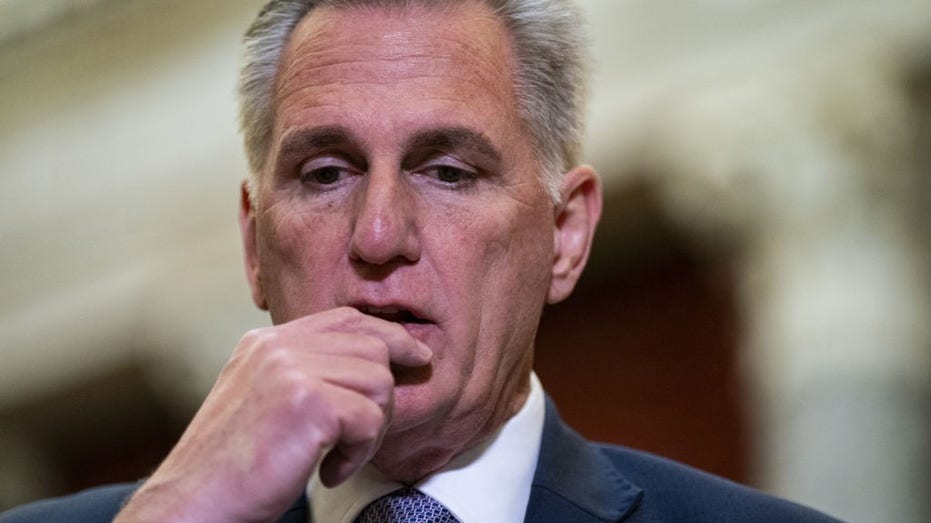EXCLUSIVE: Disagreements within the House GOP over funding for Ukraine are threatening to derail Republicans’ defense spending bill for a fourth time.
A procedural vote to advance the bill failed twice last week amid infighting over how to proceed with funding the government. Before that, a planned vote for the same legislation was scuttled over questions about whether it will pass.
The House is expected to vote on the defense bill on Friday. Multiple GOP lawmakers told Fox News Digital on Wednesday that they believe there is enough opposition to yet again cause a headache for GOP leaders — this time, regarding $300 million in funding toward Ukraine that the bill provides.
Those critics are also opposed to Ukraine funding in the bill for the State Department, Foreign Operations and related agencies. That bill does not provide a specific spending topline for Kyiv.
HERE’S HOW HOUSE REPUBLICANS ARE TRYING TO FORCE BIDEN’S HAND ON BORDER SECURITY
“Both of those bills are dead on arrival. And I told leadership, I told them ahead of time,” said Rep. Marjorie Taylor Greene, R-Ga. “I’ve been clear from day one, that no money should be going to Ukraine, that our position should be bringing peace to that country. We’re currently right now funding the destruction of Ukraine.”
Greene was the lone Republican to vote against a procedural hurdle, known as a rule vote, clearing those two bills and two others for individual floor votes.
CONGRESS RETURNS TO DC WITH FIVE DAYS TO AVERT A GOVERNMENT SHUTDOWN
But Rep. Tim Burchett, R-Tenn., who voted with the GOP on Tuesday night, said he would oppose the individual spending bills when they reached the House floor.
“We’ve made our statement, we’ve been pretty clear about that. It’s a slippery slope. Nobody trusts the Pentagon, what they say they’re doing,” Burchett said.
Asked why he voted for the rule, he said, “Bring it to the floor, I don’t mind.”
Freshman House Freedom Caucus member Rep. Eli Crane’s office indicated after this report was published that he would also oppose the bills with Ukraine aid.
“If either contains a single dollar that further funds the escalation of the conflict in Ukraine, Rep. Crane will be a solid ‘no,'” a spokesperson told Fox News Digital.
Rep. Ralph Norman, R-S.C., another skeptic of Ukraine funding, said he was “probably” leaning no on the defense and State Department funding bills.
“Why in the world they would leave that in there and not carve that out for a separate vote, I have no idea,” Norman said. “I’m gonna get advice from other people, kind of weigh it. I’m debating it.”
Norman said, “Oh yeah, big time,” when asked if conservative colleagues felt the same way.
GOP NEGOTIATORS HIT BACK AT REPUBLICAN REBELS AS SHUTDOWN THREAT LOOMS: ‘EMPOWERING SCHUMER’
House Freedom Caucus Policy Chair Chip Roy, R-Texas, did not say how he would vote but criticized the decision to leave Ukraine funding in the spending bills. Like Norman, he called for that money to be brought to the House floor on its own.
“I don’t think they should be in there. I think we should have a separate vote on Ukraine. Now, you know, whether that rises to the level of whether or not I would accept the two bills in their current form depends a lot on what the Speaker lays out in terms of the overall plan,” Roy said.
He conceded that the relatively small amount in the defense bill is “not going to drive whatever is going on in Ukraine. Though he added, “If they’re left as they are, I don’t believe that’s showing, I think, a good sense of where a number of people in the conference are. But again, we’ll see how the next 24 hours unfold.”
With just a razor-thin majority, Speaker Kevin McCarthy, R-Calif., can only afford to lose a handful of votes to pass a bill with no Democratic support. Absences can shift the number — last week, it took five GOP critics to sink the defense bill.
The opposition to Ukraine funding also spells more trouble for the Senate’s stopgap funding proposal, known as a continuing resolution (CR), which includes about $6 billion for Kyiv’s defense against Russia.
Lawmakers in the House and Senate must reach some kind of an agreement on how to fund the government by Sept. 30 or risk a partial shutdown.
This report has been updated.
























